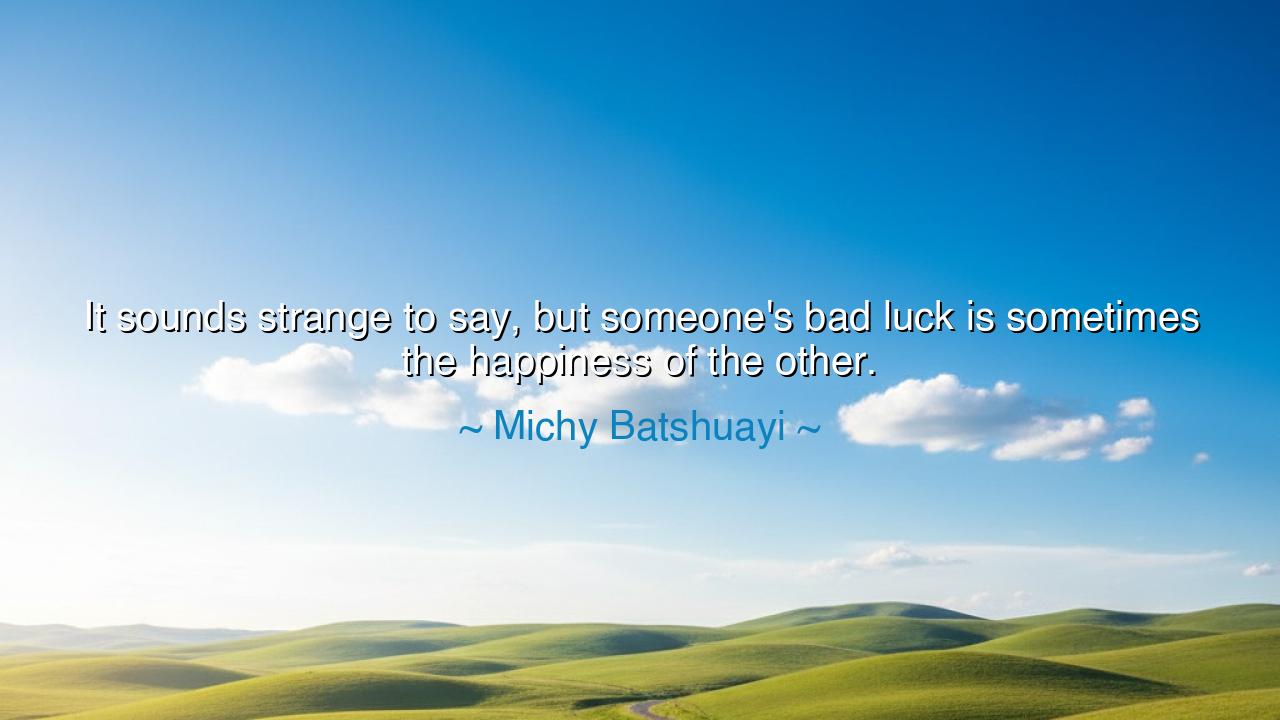
It sounds strange to say, but someone's bad luck is sometimes the
It sounds strange to say, but someone's bad luck is sometimes the happiness of the other.






The footballer Michy Batshuayi, in a moment of reflective honesty, once spoke a truth that is as ancient as it is uncomfortable: “It sounds strange to say, but someone’s bad luck is sometimes the happiness of the other.” These words, though simple, pierce deeply into the nature of fate, fortune, and the human condition. They reveal the delicate balance upon which life rests—the eternal rhythm of gain and loss, rise and fall. In them lies no cruelty, but a recognition of how intertwined our destinies truly are. For in the great turning of the world, the misfortune of one often opens the door to the blessing of another. This is not the law of greed, but the law of nature itself.
The origin of Batshuayi’s words comes from his own life as a professional athlete, where opportunities are rare and fleeting. In football, as in life, a player’s chance to shine may come only when another is injured, suspended, or falters. Batshuayi, known for his patience and perseverance, understood this well. There were times he sat on the bench, waiting for a moment that might never come. Yet when fate intervened—when a teammate’s bad luck created a vacancy on the field—he stepped forward and turned that sorrow into his own happiness. His words, then, are not a boast, but a confession—a recognition that even triumph can be born of tragedy. He speaks not as a victor gloating, but as a man aware of the strange moral texture of success.
This truth has echoed through the ages. The ancients often told stories that reflected the shifting nature of fortune. In the Histories, Herodotus writes of Croesus, the wealthy king who thought himself the happiest of men—until his empire fell and his suffering became the instrument through which another rose to glory. So too, in the cycles of war and peace, of birth and death, of love and loss, we see the same pattern: where one life declines, another ascends. The farmer rejoices at the rain that ruins the merchant’s road; the merchant profits from the drought that forces others to buy. Thus, the wise have always seen fortune not as good or evil in itself, but as a wheel that turns without pity or preference.
Yet Batshuayi’s insight also carries an ethical challenge. It calls us to recognize the humanity that connects both sides of this equation—the one who grieves and the one who gains. It is easy to rejoice in our own happiness, but harder to remember that it may have been bought by another’s pain. The ancients called this sympatheia, the bond that unites all living souls in the web of existence. To be wise, then, is to be grateful without arrogance, to accept one’s fortune with humility, and to extend compassion to those whom life has passed over. For as fortune gives today, it may take tomorrow.
There is a story from ancient Rome that illustrates this truth. When Marcus Aurelius, the philosopher-emperor, was granted power after the sudden death of his predecessor, he wept before accepting the crown. “This honor,” he said, “is given to me only because another man’s life has ended.” His happiness, he understood, was born from bad luck—from loss and death. Yet by acknowledging this, he transformed his gain into responsibility. His reign, one of justice and wisdom, stands as a testament to gratitude tempered by empathy. He did not rejoice at fate’s favor; he served humbly within it.
Thus, Batshuayi’s quote carries a wisdom far beyond the stadium. It reminds us that life is not a simple tale of winners and losers, but a vast tapestry woven from joy and sorrow. When fortune lifts you up, remember the shoulders on which you stand. When it casts you down, remember that from your fall, another may rise—and that this too is part of the world’s mysterious balance. To envy the fortunate or despise the fallen is folly; both are merely passing through the same divine current of change.
So, my child, let this truth settle gently into your heart: rejoice in your happiness, but hold it with humility. When bad luck befalls another and brings opportunity to you, accept it not with guilt, but with gratitude—and use it well. Turn the gift of fortune into service, the gain of one into the good of many. And when your own time of loss comes—as it surely will—remember that life is a circle, not a line. The one who loses today may yet be the one who helps another rise tomorrow.
For in the wisdom of Michy Batshuayi’s words lies the eternal law of life: that joy and sorrow are not enemies, but companions; that happiness and bad luck are merely reflections of each other across the great mirror of existence. To understand this is to live not as a conqueror of others, but as a student of fate—humble, compassionate, and ever grateful for the fleeting grace of your own good fortune.






AAdministratorAdministrator
Welcome, honored guests. Please leave a comment, we will respond soon